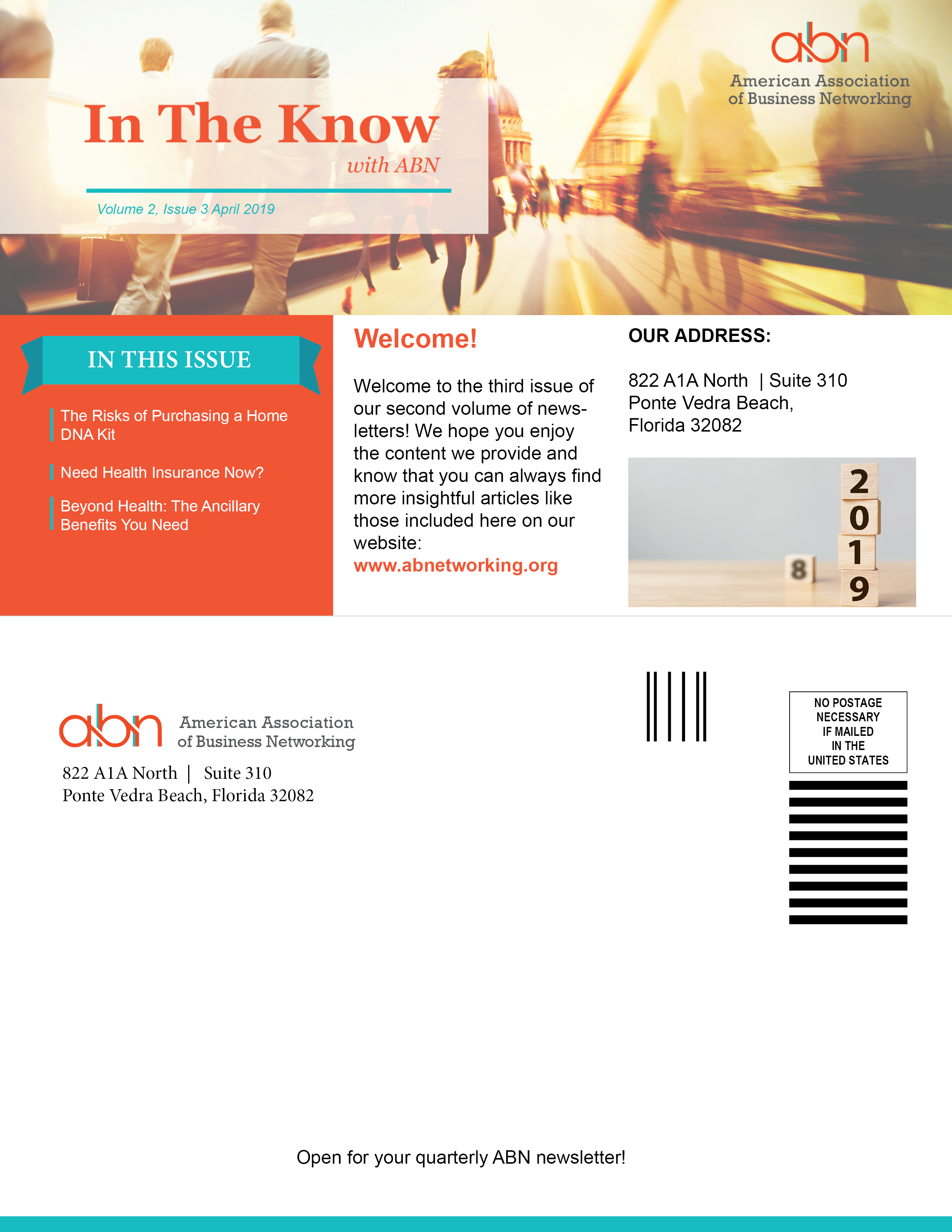ABN Newsletter Volume 2, Issue 3 April 2019



Group health insurance is usually provided by an employer and can cover just the employee or even the employee’s spouse and children.
Not providing group health coverage could be a major misstep for some companies regardless of size, as there are a number of benefits to providing Group Health Insurance coverage.
There is no question that the term health care reform has been a hot-button topic and on the lips of nearly every politician regardless of political party over the course of the past 10 years. In light of the Affordable Care Act, it has now become more affordable to purchase Group Health Insurance than for your employees to purchase health insurance individually.
Level-funding insurance plan options have been growing in popularity over the past number years. Level-funded plans are ERISA compliant and may offer more flexibility for employers with virtually no risk and offered by several reputable insurance carriers with a nationwide network of hospitals and physicians to choose from.
What has many employers especially excited about these plans is the opportunity for 10%-15% in lower premium costs and the Return of Premium potential. Unlike other policies on the market, with level-funded options, if your employees don’t rack up a large number of claims throughout the year, your company may have a substantial amount of money (originally paid in premiums) returned.
If looking at the cost of a group health insurance plan leaves you feeling queasy and the idea of paying the tax penalty sounds more appeal, you may want to think twice.
As job seekers now expect for their employers to at least partially cover their healthcare needs through group health insurance policies, walking into a job interview and being told that the company refuses to pay health care for full-time workers is a red flag. Even if a potential employee is in trouble financially, they may still take the job out of desperation but will jump ship as soon as they can afford to for greener pastures.
Providing Group Health Insurance for your employees shows a certain level of care and respect that new and existing employees will appreciate and keep in mind going further within your company.
In some cases, it’s possible that providing your employees with Group Health Insurance could give you a welcome tax write-off, not to mention added tax benefits for your employees.
Payments made to group health insurance premiums, reimbursement plans (HRAs), and Health Savings Accounts (HSAs) are generally all eligible for tax advantages as all of these payments can be made as pre-tax contributions.
As an added bonus, qualifying health insurance plans may also be eligible for HSAs for their employees. HSA’s are 100 percent owned by the individual employee and not tied to you in any way. In a 2015 study conducted by Devenir compiled data from the top twenty HSA providers in the U.S. and found a 1775% increase in assets between 2006 and 2015, showing that now more than ever, people are choosing to invest their money in HSA’s rather than insurance plans with more coverage.

Throughout our lives, we have a number of birthdays but only a few age milestones ever really stand out—thirteen, sixteen, eighteen, twenty-one, forty, and sixty-five. The milestones get fewer as we age, but few are as important as the final one.
If you or someone you love is soon to turn 65, there are a number of things to start to consider. While the potential for retirement is one, another really big decision to make is how much, or how little insurance you will need.
Three months prior to turning 65, you become eligible to sign up for Medicare. Once you review your options and make your selections between Part A, B, C, and D you must then decide if these plan benefits will be enough for you.
For those who feel they need additional coverage and benefits, supplemental Medicare insurance (otherwise known as Medigap Supplement Plans) is there to help offset any additional costs you may not have foreseen when you originally signed up for Medicare. In fact, Medicare Supplemental Insurance is sometimes called Medigap coverage because it helps to fill in the gaps in coverage that Medicare can sometimes leave behind.
Your open enrollment eligibility to sign up for one of these policies begins on the day your turn 65 and are covered under Medicare Part B. To be eligible to sign up for a Medigap policy, you must be covered under Parts A and B of Medicare.
Your open enrollment period ends six months after your 65th birthday. So what happens then? What happens if you choose to not sign up for a Medigap policy within that specific time frame but still wish to purchase it?
The simple truth of it is, you may not be able to. In the event you are able to purchase a Medigap policy in your state after the initial six-month-period of open enrollment eligibility, it may cost you a great deal more than you were originally quoted to secure the same coverage you would have gotten if you had signed up immediately following your 65th birthday. In short, there are no positives to waiting to secure Medigap Supplemental Insurance.
Medicare Parts A and Part B do not offer you 100% medical coverage from the age of 65 on. While Medicare does cover a great deal of expenses that could otherwise be quite costly and stressful, it does not cover everything.
According to Medicare.gov, Medicare Parts A and B fail to cover the following:
For many, Medicare Part A is free and is designed to help enrollees pay for inpatient services, however, according to Medicare.gov, enrollees have a $1,316 hospital inpatient deductible for each benefit period.
While Medigap will not assist enrollees in paying for long-term care, it will assist with coinsurance, deductibles, copays, and serious vision issues such as cataracts surgery which can all greatly help senior citizens looking to minimize their out-of-pocket medical expenses.

No one wants to think about their death, and for young professionals just starting their careers and families, the idea of contemplating the unimaginable can be even more unsettling. You are just getting on your feet and the last thing you are prepared to start thinking about are things such as life insurance and Accidental Death & Dismemberment (AD&D) insurance. But instead of dwelling on the complicated process of obtaining life insurance, is it possible that AD&D insurance may be the first and easiest step in protecting your loved ones should something happen to you?
According to a 2015 report issued by the Centers for Disease Control (CDC), if you are between the ages of 18 and 44 you are most likely to die in some sort of accident or “unintentional injury” rather than due to disease or congenital anomalies. Eating right, exercising often, and leading an overall healthy lifestyle may be a great way to guard yourself against health issues such as heart disease but when it comes to preventing debilitating accidents, these things have no effect on chance.
Of all accidents, car accidents are the most common with an estimated 1.3 million deaths a year, averaging out to 3,287 deaths per day with an additional twenty to fifty million people becoming injured or disabled every year according to the Association For Safe International Road Travel.
For those involved in serious accidents, recovery time can take anywhere from days to months, or even longer depending on the severity of the injury. Could you afford to be out of work for an extended period of time? If you were injured so severely that you required an amputation, forever altering your lifestyle, as well as potential job prospects, could you afford to be out of a job while recovering and retraining your muscles as well as your mind? And if the worst should happen, could your family sustain themselves without the aid of your income?
This is where the importance of Accidental Death & Dismemberment (AD&D) insurance comes in to play. No one ever plans for an accident to occur, but what if there were a way that you could? According to the 2012 Life Happens Disability Survey, approximately half of all Americans wouldn’t be able to cover their own expenses after just a single month without receiving a paycheck.
Statistics like these can be scary but they don’t need to be. AD&D insurance could help in the face of uncertainty. Your family’s welfare is important and with AD&D insurance, you can help to safeguard your family’s financial security in the event you are no longer able to provide for them should you experience a debilitating or fatal accident.
While the two can sometimes be purchased together, it is important to understand that AD&D insurance is not Term Life insurance. AD&D typically does not issue a payout on your policy in the event you pass due to a terminal illness; AD&D insurance will, in most cases, issue a payout should you fall victim to a serious accident resulting in the loss of limb, senses, or life.

The Group Health Insurance industry continues to change with premiums continuing to rise. You have probably changed insurance carrier’s multiple times hoping to secure for the deal of the year.
So, the question is: Is that all there is? Change carriers and tweak my benefits?
Not all Group Health Insurance plans are the same and one of the largest problems we come across in the industry is that so few companies are aware of all of their options. Most of the time, the reason behind this is because businesses are often dependent upon their insurance agent to present them with their group health options. In doing so, it is important for businesses to note and understand that like the differing group health plans on the market, not all agents are alike. Agents often differ greatly in regard to their level of experience and general knowledge pertaining to new and emerging trends in the industry.
Here at Member Benefits, we specialize in providing businesses with creative solutions that can greatly reduce their health insurance premiums, while still maintaining a comprehensive list of benefits that satisfy your employees and promote attraction and retention.
Perhaps one of the latest trends that many businesses have found themselves considering over the course of the past two years is something called level-funding.
Level-Funding is a partially self-insured option that functions just like a fully-insured plan and has little to no risk involved due to the built-in stop-loss insurance provisions. If your business qualifies, your premiums could end up being 10 to 15 percent less than what they would have been with a traditional fully-insured plan.
With a level-funded plan, there is no need for a separate bank account and the hospital and physician networks are nationwide and very large. As an added bonus, if your business has had a successful year and the claims are low, you may be entitled to receive a refund of up to 50 percent of the claims surplus. Some level -funded plans now offer no network limitations, giving you access to any doctor or hospital across the country!
Are you worried about the possibility of your deductibles resetting if you make the change now? One of the many great things about level-funding carriers is that they will give you credit for any deductible you may have met up until the point of transition.
So, when closing out your year, rest assured that there is no rule or law stating that you must settle for your same Group Health Insurance as opposed to weighing your options. Be confident in your decision. It is important to take the necessary time when you are not busy to explore your options and a level-funded option may prove to be a great place to start.

The next official ACA Open Enrollment period isn’t slated to begin until November 1, 2019. But depending on your circumstances, you may not have to wait that long to obtain coverage.
Sometimes our circumstances change, and if they change due to specific events, you and your dependents may be able to secure health insurance through a Special Enrollment Period. When this occurs, it is called a Qualifying Life Event, otherwise referred to as a QLE.
There are several types of Qualifying Life Events that may grant you a Special Enrollment Period. Some of the most common examples include:
Haven’t experienced a QLE but still need health coverage? A non-ACA health plan could be the answer. Also referred to as Short Term Medical Plans, recent legislative changes have loosened the restrictions surrounding these plans and have increased their appeal.
Previously, a Short-Term Medical plan could only provide coverage for up to 90 days. But due to recent regulatory changes, these plans can now be continued for up to a year. Additionally, in some cases applicants may now renew their plan for up to three years.
Because Short-Term Medical Plans are considered non-ACA health plans, it is worth noting that they may not cover all that an ACA health plan would. For example, applicants could be denied coverage due to a pre-existing medical condition, maternity care may not be covered, and there could be an annual dollar limit on coverage. However, these plans are also typically less expensive than ACA plans and could be a good alternative for individuals seeking more affordable options.

In March of this year, ancestry DNA testing giant, 23andMe, announced that they would begin testing user DNA for Breast Cancer genes, more specifically identified as the BRCA1 and BRCA2 genes. While technically able to test for these genes for years, it wasn’t until this past March that the FDA officially signed off on it, therefore, making the 23andMe at-home DNA test, the first FDA-approved direct-to-consumer test to evaluate one’s potential risk for cancer.
The test is offered as an add-on to 23andMe’s standard ancestry report for a total of $199 and is delivered alongside a variety of other reports designed to tell you if you possess certain genetic markers which may suggest a predisposition to things such as:

With a variety of lens materials, types, and coatings available to choose from – sitting in your optometrist’s office listening to the tech rattle off your options can understandably feel overwhelming. For the most part, consumers want something to get the job done at the lowest possible price unless they have other very specific concerns.
However, depending on your location, prescription strength and needs, as well as your eye doctor, you could be spending anywhere from approximately $95 to over $1,000 for a pair of prescription eyeglasses. According to health.costhelper.com , consumers spend on average approximately $196 for a pair of eyeglasses, and until fairly recently they didn’t have much of a choice.
However, over the course of the past 10 to 15 years, a new kind of eyeglass business has hit the market, cutting out the middleman, and cutting the ultimate cost for consumers. Zenni Optical, for example, will sell the complete set of fashionable eyeglasses (frame and lenses) for as low as $12, and their competitors aren’t too far behind.
Just in the past five years, a number of these online eyeglass retailers have been the talk of the fiscally conscious eyeglass consumer community since their inception.
But with all of these new online retailers on the market, which ones are the best to purchase eyeglasses from?

If you and your family have been skipping trips to the dentist, you’re not alone. “For every adult without health insurance, an estimated three lack dental insurance” this comes according to a quote issued by the Kaiser Family Foundation based off of research conducted by the National Association of Dental Plans.
But what so few realize is the close relationship between one’s oral health and their overall health. A person’s mouth is a haven for potentially harmful bacteria, regular flossing, brushing, and cleanings can keep the bacteria at bay but when a person is neglecting their teeth, the bacteria can build and lead to infections, tooth decay, and gum disease. From there, it is possible for the bacteria to enter the bloodstream and travel to other parts of the body leading to other serious problems.
According to Mayoclinic.org, the following have been found to possibly share a link with poor oral care:
And if you suffer from any of the following conditions, your oral health may be at risk of deterioration without extra care administered by a dental professional:
In addition to the most noted above health issues, poor oral health has also been linked to such health issues as eating disorders, rheumatoid arthritis, head and neck cancers, and Sjogren’s syndrome among others.
When a person develops a cold, or the flu, that’s when they know they need to take it easy for a few days and give their body time to rest and recharge. But when it comes to your teeth, symptoms of ailing oral health may not be so obvious. This is why it is important to visit your dentist for routine exams and cleanings to avoid problems down the road.